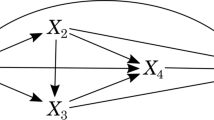Abstract
In this paper I start by briefly presenting an analysis of token cause and of token causal relevance that I developed elsewhere, and then apply it to the famous thirsty traveler riddle. One general outcome of the analysis of causal relevance employed here is that in preemption cases (early or late) the preempted cause is not a cause since it is causally irrelevant to the effect. I consider several variations of the thirsty traveler riddle. In the first variation the first enemy emptied the canteen and the second enemy threw it away. On this variation, the act of neither enemy comes out, on the analysis employed here, as causally relevant to, and thus not as a cause of, the fact that the traveler died, but the conjunction of the two acts is a cause of it. This version is a case of mutual preemption. I argue that it has the same structure as the voting paradox, which thus has an analogous solution. In the standard version, in which the first enemy added poison to the water in the traveler's canteen, the act of the second enemy (who threw the canteen away) comes out, on the analysis used here, as causally relevant to and as a cause of the fact that the traveler died, but the act of the first enemy comes out as neither. I also make a comparison with Lewis' accounts, and discuss alternative treatments of the puzzle such as those of Hart and Honore and of Gavison, Margalit, and Ullmann-Margalit.
Similar content being viewed by others
Author information
Authors and Affiliations
Rights and permissions
About this article
Cite this article
Kvart, I. Probabilistic Cause and the Thirsty Traveler. Journal of Philosophical Logic 31, 139–179 (2002). https://doi.org/10.1023/A:1015507124004
Issue Date:
DOI: https://doi.org/10.1023/A:1015507124004




